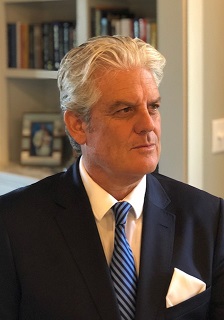From the CEO – November 2022
 Much of the handwringing over the fate of some emerging markets is connected to monetary policy in the developed world, specifically by the Federal Reserve. This is a well-worn story in 2022 and suggests (simply) that since tightening pushes the greenback higher against other currencies, this creates havoc with the balance sheets and public debt of some emerging markets as their revenues tend to be in local currency. The mismatch was the subject of Andrew Pettis’ fine piece some two decades ago (The Volatility Machine) and has been part of every emerging market debt crisis for decades.
Much of the handwringing over the fate of some emerging markets is connected to monetary policy in the developed world, specifically by the Federal Reserve. This is a well-worn story in 2022 and suggests (simply) that since tightening pushes the greenback higher against other currencies, this creates havoc with the balance sheets and public debt of some emerging markets as their revenues tend to be in local currency. The mismatch was the subject of Andrew Pettis’ fine piece some two decades ago (The Volatility Machine) and has been part of every emerging market debt crisis for decades.
Early last month the Fed implemented a fourth consecutive ¾ point interest rate increase to take the short-term borrowing rate to its highest level since the beginning of 2008. Combined with the array of larger geopolitical concerns (the war in Ukraine) and the concomitant fears of economic recession in much of the world, the USD has continued to march higher in 2022 despite some recent pullback of late.
Parts of Africa have been centered out in all of this as some countries on the continent have rather high debt as a percentage of their economies. This list includes Kenya, Ghana, Ethiopia, Nigeria, Zambia, and Mozambique. This is a concern. But it’s the quality of the debt that is important to note (denomination, concessional, etc.) and the servicing costs as a percentage of total exports.
Our International Country Risk Guide series considers these items in detail. And looking at the servicing of the debt – all things being equal – some of the African countries signaled out above don’t appear to have relatively high servicing burdens. To be sure, Kenya and Mozambique appear to top the list. But then the analysis of the debt burden of these countries would have to move into a more granular territory to assess the overall risk to, as examples, debt repayment, repatriation, payment terms/delays, fiscal policy, and then into larger political issues as overall government stability and its various components. This is where informed geopolitical and country risk assessment comes into play which should then help form the basis of an conversant commentary.
We are always pleased when the academic and applied community considers our data and applies it to explain the behavior of various asset classes. In a recent piece published in the EuroMed Journal of Business, Bechir Ben Ghozzi and Hasna Chaibi provided a comparative analysis between emerging and developed financial markets in terms of the effects of political risks on stock market returns and volatility. The authors also examined whether this impact depended on the nature of political risks. As such, the study’s goal was to isolate which markets were the most profitable and the riskiest in terms of political risks.
The study’s methodology is comprehensive. But in the interests of brevity some basic findings are instructive: The ICRG composite political risk value is priced into both stock markets. Moreover, the effect of political risk is positive for excess returns and negative for volatility. Finally, political risk leads to more volatility in developed markets, yet the effect of individual risk components varies according to the market category.
The value-added of the study is that it offers a framework for predicting market returns and volatility using changes in the political risk of the country, and thus the ability to make more nuanced investment.
* * *
We continue to receive considerable demand for the newest addition to our popular Researchers’ Dataset series – one that offers clients a more granular look at the political risk components of the ICRG, supported by 20 years of monthly data. The new series works as an excellent complement to the other data bundles announced this year affecting ESG, corruption, and internal/external conflict. Scores of academic studies have been conducted using these series, providing unique insights in asset volatility, government responses to the pandemic, and many more. Contact us for more information.
I had an informative and enjoyable meeting with several faculty from the SKEMA business school in late November in Paris. PRS’ association with the university continues to evolve and some very interesting ventures are planned. Stay tuned.
Correspondingly, I’m looking forward to meeting with colleagues and friends at the International Anti-Corruption conference in Washington in December. The list of topics for discussion are very timely, ranging from the implications of the war in Ukraine to the requirements of ESG.
PRS’ new book Quid Periculum? Managing Political Risk in an Age of Uncertainty, co-edited and co-authored by Peter Marber (Harvard/Aperture Investors) is now available! The book includes such diverse topics as risk forecasting techniques, reliability measures, the impact of political risk on asset prices and sovereign debt workouts. Also featured is a special roundtable discussion by some of the world’s leading voices in the field on the future of political risk, who combine to address some of the challenges presented by globalization and COVID-19.
November was another fruitful month for new and returning clients, ranging from some of the world’s top universities to the largest institutional investors throughout the US, Europe, the UK, and the Middle East and Asia. Our data are now regularly featured in the research of the IMF, Bank for International Settlements, and various central banks, such as the Bank of Italy.
Our ICRG political risk scoring changes were very robust in November, affecting some 105 countries (of 141) and over 100 individual political risk metrics!!
ICRG and related PRS data continue to be the gold standard of all geopolitical risk data among the scholarly and research communities. For example, using our ICRG data in part, recent IMF Working Papers have sought to provide insight into whether sovereign financing conditions improve through greater transparency, and whether tax reform announcements were likely prior to or after an election? Was there a difference between developed and emerging markets? (https://lnkd.in/gRkeVXv7) (https://lnkd.in/gBWK8YTm)
Thanks for your continued support, and please contact us if we can be of any assistance.

Chief Executive

PRS INSIGHTS
Moving beyond current opinions, a seasoned look into the most pressing issues affecting geopolitical risk today.
EXPLORE INSIGHTS SUBSCRIBE TO INSIGHTS
